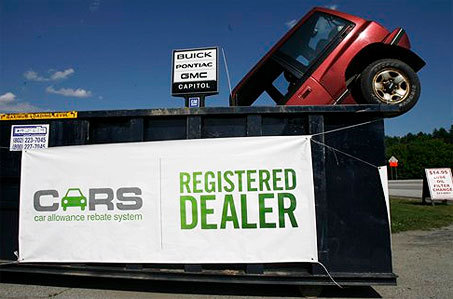| « This is a brilliant TIME MAGAZINE article about Obamacare! | All this racism is killing me inside... » |
Cash for Clunkers, another example of the government underestimating...

The program was designed to encourage owners of pollution-spewing gas guzzlers to trade them in for NEW, more-efficient cars, helping the hard-pressed auto industry and the environment, too. Enticed by rebates of $3,500 to $4,500, car owners are jumping at the offer. It worked, almost too well.
Far more drivers signed up for the program, leaving dealers panicked over when or if the government would make good on the hefty rebates.
The House was first in what's expected to be a fast pit stop, voting to pour in another $2 billion. The Senate has yet to act -- it is expected to take up the measure next week -- but the White House said weekend deals would count, no matter what.
President Obama said the program has "succeeded well beyond our expectations" and is pushing the Senate to pass the measure next week.
But Republicans are questioning the government's readiness for wading deep into other private-sector strongholds, such as health care.
The government can't reasonably calculate the response for an automobile trade in program, how can they calculate the response to a much more complicated program?
The government is now going to spend another 2 billion dollars on the CARS program. The government underestimated the cost of the program by two thirds! The idea behind the program is fairly simple. There are only two possible CARS benefits, $3,500, or $4,500 dollars. Compared to health care the CARS program is a walk in the park; there are only two figures to deal with. I wonder how much health care "reform" is really going to cost?
The stated purpose is to get people out of their inefficient vehicle, and into a NEW fuel efficient vehicle, while at the same time spurring auto sales. Here are the requirements to trade in:
http://www.cars.gov/faq#category-06
* have been manufactured less than 25 years before the date you trade it in
* have a "new" combined city/highway fuel economy of 18 miles per gallon or less
* be in drivable condition
* be continuously insured and registered to the same owner for the full year preceding the trade-in
* The trade-in vehicle must have been manufactured not earlier than 25 years before the date of trade in and, in the case of a category 3 vehicle, must also have been manufactured not later than model year 2001
The program introduces a number of unintended side effects. For instance, many of the people trading in older cars and trucks most likely have no car payments. There are not many vehicles manufactured within the past 5 or 6 years that have a combined EPA fuel efficiency rating of under 18 MPG. Sure, the owners of new more fuel efficient vehicles will save on fuel, but what about payments on a new car? People are going to be spending a lot more money with a new vehicle than they would with an older, paid for vehicle, regardless of the fuel efficiency. Insurance premium rates are higher on newer vehicles.
With the government making the down payment, new vehicle prices will remain artificially high. This current increase in auto sales does not reflect actual market forces.
Banks will have a much harder time selling repossessed cars. The CARS benefit DOES NOT apply to used cars.
There will be huge vacuum when the program expires. New car sales will drop.
http://www.foxnews.com/politics/2009/08/01/popularity-web-snafus-nearly-broke-clunkers/
The backlog had been building for weeks. Auto dealers could begin offering the rebate at the beginning of the month, and many began doing so over the July 4 weekend. But it was not until a week ago that dealers could begin filing for reimbursement, leaving them on the hook for as much as $4,500 per car until they get the federal money.
That's when they ran into difficulties with a federal Web site ill equipped to handle the volume of claims and the multiple documents each submission requires. Some dealers said the process took upward of an hour for each transaction, caused repeated rejections and consumed many hours submitting and resubmitting data.
At Walser Toyota in Bloomington, customers began lining up on Monday before doors opened at 7:30 a.m.. Swenson said. By that afternoon, his dealership had done 150 trade-ins under the program. His salesmen worked overnight to scan and submit forms.
But of the 150, he said, only 30 received responses and all of those were rejections.
Dealers are now on the hook for more than 1 billion dollars, and there is literally no clear plan to reimburse them. It's not sure when and if the government will make good on the reimbursements; how long can the dealers hold out?
Government controlled health care doesn't sound so nice now, does it?
Note: You DO NOT need to register to leave a comment.
1 comment
I wonder exactly how the government expects to make more than $4500 on their investment. What a mess...